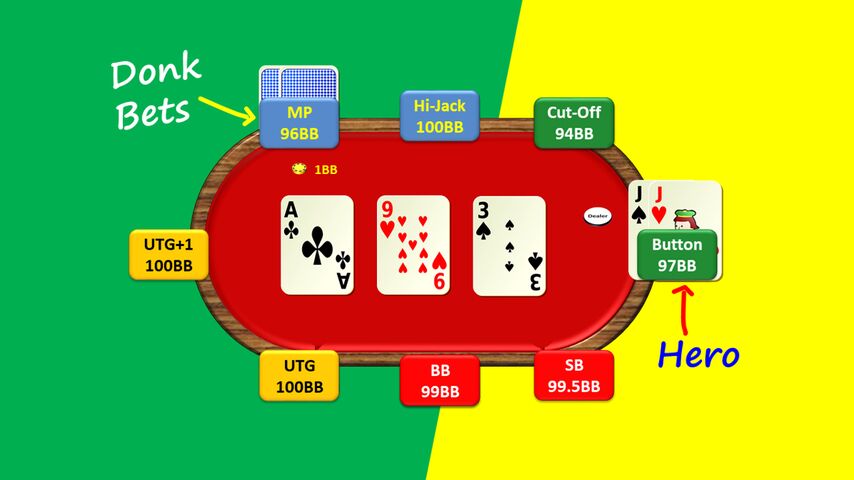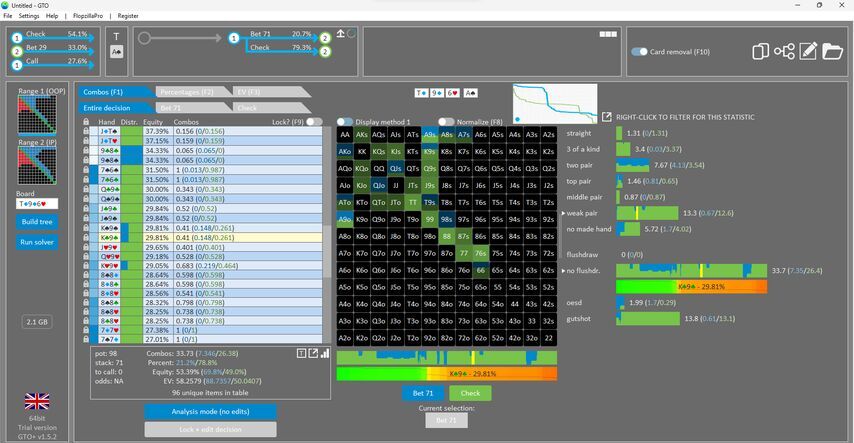To understand donk bets fully, we must first grasp its definition: what is the donk in poker? The term "Donk bet'' is derived from "donkey," which has long been used in poker slang to describe an inexperienced or unskilled player often unfamiliar with the game's rules. Simply put, a donk bet is any bet placed by an out-of-position player who was not the preflop aggressor in a hand.
Dealing with Donk Bets
Although donk bets are declining in popularity among online poker players, they are still prevalent in many live cash games. It's crucial to exercise prudence when you're up against a donk bet and figure out what range of hands your opponent is betting with. Most players who routinely donk bet do so due to a lack of poker expertise and not as part of a well-balanced strategy. It can work in your favor.
If you've missed the board and are up against a donk bet, you should typically fold your hand. Your opponent will have a lot more made hands than bluffs, and many of their bluffs can still have a considerable equity advantage over you. However, most weak players won't want to donk bet their best cards, such as sets or two pairs, which is precisely why their range will be inconsistent.
A massive raise may do wonders against all of these hands since they can't bear the pressure of dealing with a big raise, meaning you have a strong hand. Even if they decide to keep going, they will do so against all odds, which means you will be profitable in the long run.
Once you've identified the players that bet their mediocre cards ppost-flop, you can successfully exploit them for many hands to come, as long as you never let them know you're bluffing them.

Poker players across platforms like AmericasCardroom, PokerStars, and 888 Poker have incorporated donk bets into their gameplay. Using them too often might make these unconventional tactics relatively exploitable. They can sometimes surprise opponents. Such tactics are, however, easily adapted by seasoned players, making fans of donk bets into easy targets at the tables.






Donk Betting Affects Table Image
A strong table image is crucial in poker, shaping how other players perceive us and influencing their decision-making processes. By employing a consistent and strategic playing style, we can earn the respect of our opponents and garner a reputation as thoughtful and formidable players.
Donk betting hurts your table image since it makes you exploitable, because by definition, it can make you look like a donk to some. Even less skilled opponents will be able to recognize the imbalance that donk betting in your checking range creates. It is tough to beat players with balanced ranges. Your opponents may take advantage of you by folding their weak cards, raising a value range, and calling their draws if you are donk betting any pair and better on the flop, for instance. Your opponent may very profitably bluff when you check since they know you have a poor hand.
Check Raise Instead of Donk Betting
Check-raising enables us to increase the pot on the flop after the opponent c-bets if we flop a monster hand as the defensive player, such as a set, two-pair, straight, or flush. Check-raising also allows us to scoop the pot more frequently and gain more chips if we miss the flop but make a drawing hand like a straight or flush draw.
Even if we entirely miss the flop, check-raising may still be a successful strategy on boards that connect with our range better than the initial raiser's flop, enabling us to win the pot on good boards regularly. The sole disadvantage of opting for a check-raise as opposed to a donk bet is that our opponent gets to check back, meaning we cannot execute our strategy.
Nonetheless, when the raiser checks back, other options become available, such as a lead on the turn and a check-raise on the turn, all of which may be preferable to a donk bet on the flop.
When to Donk Bet
In certain situations, this sort of bet may be made on purpose as a bluff, but you must manage the timing to do it correctly. When is it appropriate to make a donk bet on purpose, and what skills should we develop to succeed? Usually, it is most effective when you have position over your opponent and they have displayed weakness in the prior betting round.
Here are a few situations when a donk bet could be appropriate:
- If you have a good hand that may be susceptible to overcards on the turn, donk bets may help you protect your hand while increasing the pot, especially in multiway pots.
- When you wish to balance your range, donk bets may help. Using them can keep your opponents guessing and avoid becoming too predictable.
- When playing versus aggressive players, donk betting might throw off their betting patterns and force them to take a step back and reevaluate their hand.
You can also try experimenting with donk bets in freerolls, where you won’t risk any money but gain valuable hand experience.
- Increased first deposit bonus
- Increased rakeback and reloads
- Help with deposits and cashouts
- Access to private freerolls
- Round-the-clock support
The purpose of the donk bet is to attempt to over-realize your equity by betting and extracting value from your opponent or forcing them to fold, denying them equity. Using poker solvers is an excellent approach to knowing when to donk bet.

Is "donk" betting essential for winning in poker? Absolutely not. Several professionals have succeeded tremendously without ever placing a "donk" bet. However, feel free to try it out and see if it helps you if you want to include it in your game to avoid getting too predictable. Undoubtedly, remember that it's tough to do it correctly.
Conclusion
Donk betting remains a controversial yet intriguing play in poker. Others recognize its potential to surprise opponents and obtain a tactical advantage, even though some view it as an unorthodox and risky move. While it may be a good tactic for gaining control of the pot or concealing the strength of your hand, it is not without risk. Knowing when and how to apply this technique is essential for poker success.

















